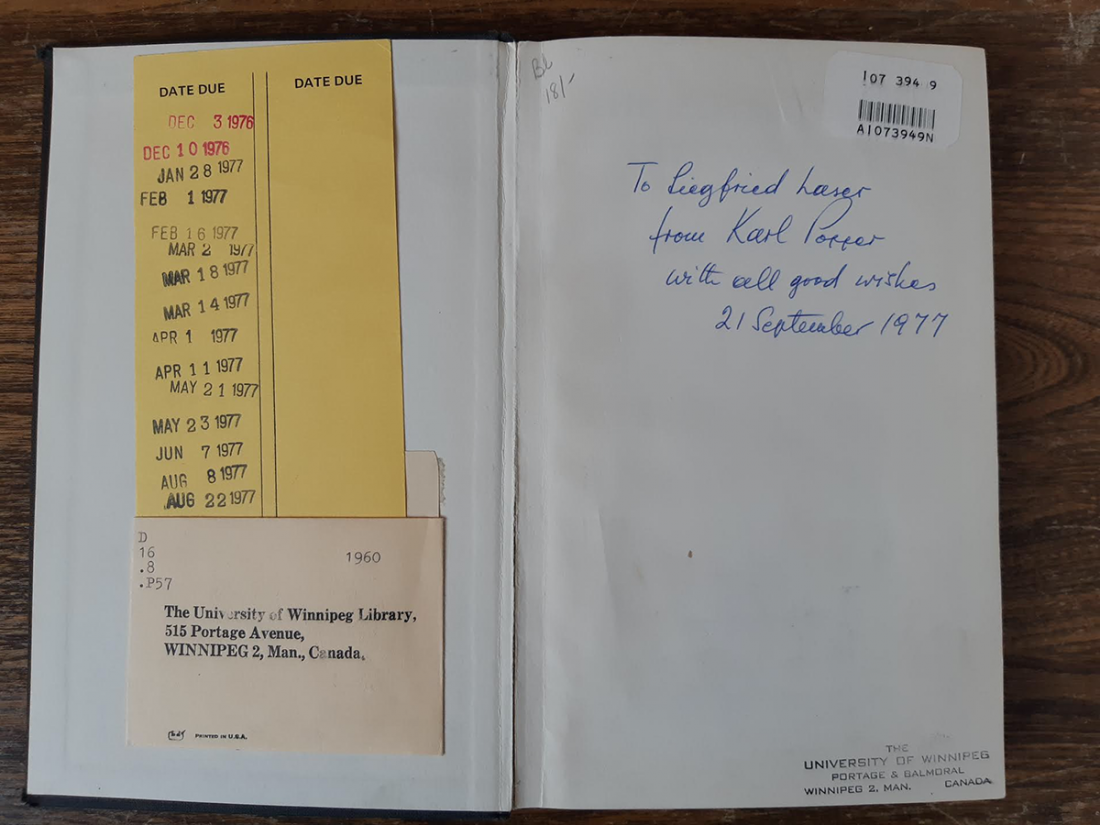Philosophy book will return to library after 43 years
Book by Popper is adorned with his signature
Note: The U of W Library is currently discouraging individuals from returning borrowed resources due to the COVID-19 pandemic.
A book belonging to the University of Winnipeg (U of W) Library may finally return home after more than 40 years. Then-philosophy student Siegfried Laser borrowed Karl Popper’s The Poverty of Historicism from the library in August 1977 before embarking on a trip to Europe.
On Laser’s trip, the idea occurred to him to contact Popper and Jürgen Habermas, both philosophers he was studying, to see if he could arrange to meet them. Popper lived in London, and Habermas lived in Germany. He says that their phone numbers were public.
“I actually got through to Popper, and he agreed to meet with me at a particular time,” Laser says. He still chuckles at how a young student was able to phone and meet Popper, an important 20th-century figure.
This philosopher of science “is best known for his emphasis on making a clear distinction between science and what he calls ‘non-science,’” according to Christopher Brittain, dean of divinity at the University of Toronto’s Trinity College.
“His contribution was to advance the view that a key attribute of a scientific statement is that it is possible to test it against an empirical test,” he says in an email to The Uniter.
The book discusses how the idea of historicism, “an approach to the social sciences which assumes that historical prediction is their principal aim” is corrupt. Laser still has the book, but it is now adorned with an inscription by Popper himself.
Laser still recalls his roughly half-hour meeting with Popper in his London home.
“Popper was a very courtly gentleman,” he says, adding that he attempted to conduct an interview but quickly realized that he “didn’t have enough background” for that.
The meeting “turned into a social visit. It was great,” Laser says.
Popper wrote an inscription for Laser on the library’s copy of The Poverty of Historicism, which he was carrying with him. It reads “To Siegfried Laser, from Karl Popper, with all good wishes, 21 September 1977.”
“Written in 1936 and updated in 1957, this book was written in response to the rise of fascism and communist authoritarianism in Europe,” Brittain says. He believes Popper’s work is still relevant today.
“Popper’s approach to knowledge, which both acknowledges that science is a product of limited human culture but also defends its distinctive contribution and insight, remains a relevant and important resource for adjudicating truth claims in a polemical age,” he says.
Laser, now retired, worked as a civil servant and a commercial realtor.
“It took me away from philosophy,” he says. However, Laser has returned to the U of W to audit some philosophy courses, one of the reasons he wants to return the book.
“Auditing these courses, it feels like I’m picking up some dropped threads,” he says.
Laser hopes to return The Poverty of Historicism to the library later this year.
Published in Volume 74, Number 23 of The Uniter (March 26, 2020)







